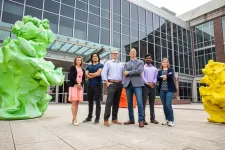Autism brain states hold the key to unlocking childhood memories
New research reveals that “infantile amnesia” – the forgetting of memories formed during early infancy – is both reversible and preventable
2023-11-08
(Press-News.org)
Neuroscientists have discovered a fascinating connection between the retention of early life memories and brain developmental trajectories associated with autism [Wednesday 8th November 2023].
Most of us remember little of our experiences from before two years of age. This form of memory loss, termed “infantile amnesia” refers to the seemingly complete loss of episodic and autobiographical memories formed during early life. The research team at Trinity College Dublin investigated how infantile amnesia is affected by forms of autism.
The maternal immune response, sparked into life in response to infection during pregnancy, is known to contribute to the cause of autism in both humans and mice. The Trinity neuroscientists report for the first time that this altered brain state also prevents the usual loss of memories formed during infancy.
Using a mouse model the team behind this discovery showed that exposure to maternal immune activation, where inflammation is artificially induced during pregnancy in the absence of infection in order to alter offspring brain development, acts as a safeguard against developmental memory loss in early life by impacting the way specialist memory cells (engrams) in the brain function.
Furthermore, the study revealed that memories normally forgotten from infancy can be permanently reinstated if the correct memory engrams are activated in adults (in these experiments they used an “optogenetics” approach, which uses light to trigger specific neural pathways linked to the memory engrams of interest). These findings imply that infantile amnesia stems from a retrieval deficiency, as early childhood memories are still stored in the adult brain but cannot normally be accessed through natural recall.
Dr Tomás Ryan, Associate Professor in Trinity’s School of Biochemistry and Immunology and the Trinity College Institute of Neuroscience, is senior author of the article that has been published today in the leading international journal, Science Advances.
Dr Ryan emphasised the significance of these findings stating:
“Infantile amnesia is possibly the most ubiquitous yet underappreciated form of memory loss in humans and mammals. Despite its widespread relevance, little is known about the biological conditions underpinning this amnesia and its effect on the engram cells that encode each memory. As a society, we assume infant forgetting is an unavoidable fact of life, so we pay little attention to it.”
“These new findings suggest that immune activation during pregnancy results in an altered brain state that alters our innate, yet reversible ‘forgetting switches’ that determine whether the forgetting of infant memories will occur. This research holds significant implications for enhancing our comprehension of memory and forgetting across child development, as well as overall cognitive flexibility in the context of autism.”
Lead author of the study, Dr Sarah Power, who completed her PhD research in Dr Ryan’s team (now a postdoctoral researcher at the Max Planck Institute for Human Development in Berlin, Germany), said:
“Our brains’ early developmental trajectories seem to affect what we remember or forget as we move through infancy. We now hope to investigate in more detail how development affects the storage and retrieval of early childhood memories, which could have a number of important knock-on impacts from both an educational and a medical perspective.”
This study marks a major milestone in developmental memory research by shedding light on the connection between the retention of early childhood memories and maternal immune responses associated with Autism spectrum disorder (ASD). It also emphasises the adaptability of brain function in response to environmental challenges across embryonic and early postnatal development.
This research was supported by the Jacobs Foundation; Science Foundation Ireland; the European Research Council; Boehringer Ingelheim Fonds; the Lister Institute of Preventive Medicine; the Brain & Behavior Research Foundation; and the Canadian Institute for Advanced Research (CIFAR).
For further engagement and research updates see: https://www.ryanlabtcd.org/team or follow @RyanLabTCD, @TJRyan_77, @SarahDPower on X.
END
ELSE PRESS RELEASES FROM THIS DATE:
2023-11-08
The research, published today in Science Advances, is the first to use a sophisticated human tissue model to explore the interaction between host and pathogen for six common species that cause urinary tract infections. The findings suggest that the ‘one size fits all’ approach to diagnosis and treatment currently used in most healthcare systems is inadequate.
Urinary tract infection (UTI) is a growing problem, with around 400 million global cases per year and an estimated 250,000 UTI-related deaths associated with antimicrobial resistance ...
2023-11-08
Researchers at Lund University, together with colleagues at the NIST Synchrotron Facility in the USA, have mapped on an atomic level what happens in a virus particle when the temperature is raised.
"When the temperature rises, the virus's genetic material changes its form and density, becoming more fluid-like, which leads to its rapid injection into the cell," says Alex Evilevitch a researcher at Lund University who led the study.
Viruses lack their own metabolism and the ability to replicate independently; they are entirely dependent on a host cell to multiply. Instead, the virus hijacks the internal machinery of the infected cell ...
2023-11-08
Researchers at the University of São Paulo (USP) in Brazil, partnering with Foresee Pharmaceuticals, a Taiwan and US-based biopharmaceutical company, have tested a synthetic molecule for the treatment of heart failure. The study, funded by FAPESP, was published yesterday (11/07/2023) in the European Heart Journal. The theme was also highlighted in the magazine's editorial.
Heart failure is a condition in which the heart muscle cannot pump enough blood to meet the body's needs for blood and oxygen. It causes more deaths worldwide than any other disease, in the sense that other cardiovascular disorders ...
2023-11-08
Making decisions is hard. Even when we know what we want, our choice often leaves something else on the table. For a hungry mouse, every morsel counts. But what if the decision is more consequential than choosing between crumbs and cheese?
Stanford researchers investigated how mice resolve conflicts between basic needs in a study published in Nature on Nov. 8. They presented mice that were both hungry and thirsty with equal access to food and water and watched to see what happened next.
The behavior of the mice surprised the scientists. Some gravitated first ...
2023-11-08
The study is based on a new database created by the researchers which combines, for the first time, datasets on distribution and datasets on lifecycles, making it possible to establish the prevalence of different lifecycles around the globe. It uses empirical tools and big data to examine theoretical paradigms about the way in which human disturbance is affecting annual plants and their global distribution. Among other things, it was found that annuals are expected to benefit more with the rise in human population density and due to climate change, which ...
2023-11-08
Scientists have engineered a chromosome entirely from scratch that will contribute to the production of the world’s first synthetic yeast.
Researchers in the Manchester Institute of Biotechnology (MIB) at The University of Manchester have created the tRNA Neochromosome – a chromosome that is new to nature.
It forms part of a wider project (Sc2.0) that has now successfully synthesised all 16 native chromosomes in Saccharomyces cerevisiae, common baker’s yeast, and aims to combine ...
2023-11-08
A UK-based team of Scientists, led by experts from the University of Nottingham and Imperial College London, have completed construction of a synthetic chromosome as part of a major international project to build the world’s first synthetic yeast genome.
The work, which is published in Cell Genomics, represents completion of one of the 16 chromosomes of the yeast genome by the UK team, which is part of the biggest project ever in synthetic biology; the international synthetic yeast genome collaboration.
The collaboration, known as 'Sc2.0' has been a 15-year project involving teams from around the world (UK, US, China, Singapore, UK, France and Australia), working together ...
2023-11-08
CHAMPAIGN, Ill. — A new antifungal molecule, devised by tweaking the structure of prominent antifungal drug Amphotericin B, has the potential to harness the drug’s power against fungal infections while doing away with its toxicity, researchers at the University of Illinois Urbana-Champaign and collaborators at the University of Wisconsin-Madison report in the journal Nature.
Amphotericin B, a naturally occurring small molecule produced by bacteria, is a drug used as a last resort to treat fungal infections. While AmB excels at killing fungi, it is reserved ...
2023-11-08
Research consortium investigators analyzed over 314,000 cells from rheumatoid arthritis tissue, defining six types of inflammation involving diverse cell types and disease pathways
Understanding the disease at single-cell level may advance targeted drug development and treatment strategies
Rheumatoid arthritis (RA) is an autoimmune disease characterized by inflammation that leads to pain, joint damage, and disability, which affects approximately 18 million people worldwide. While RA therapies targeted to specific inflammatory pathways have emerged, only some patients’ symptoms improve with treatment, emphasizing the need for multiple ...
2023-11-08
About The Study: In this study that included 3.4 million adults, co-administration of the BNT162b2 BA.4/5 bivalent mRNA COVID-19 vaccine (Pfizer-BioNTech) and seasonal influenza vaccine was associated with generally similar effectiveness in the community setting against COVID-19–related and seasonal influenza vaccine-related outcomes compared with giving each vaccine alone and may help improve uptake of both vaccines.
Authors: Leah J. McGrath, Ph.D., of Pfizer Inc., in New York, is the corresponding author.
To ...
LAST 30 PRESS RELEASES:
[Press-News.org] Autism brain states hold the key to unlocking childhood memories
New research reveals that “infantile amnesia” – the forgetting of memories formed during early infancy – is both reversible and preventable

